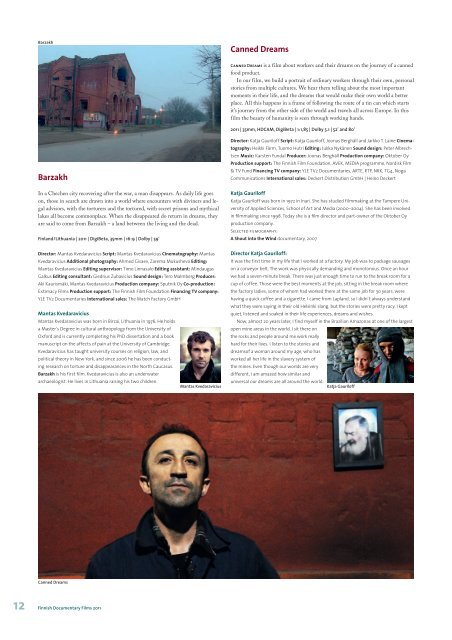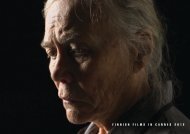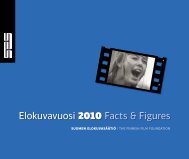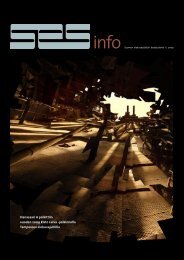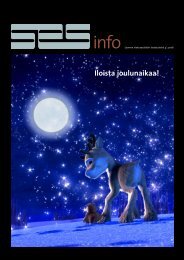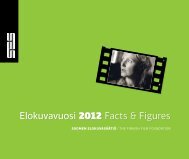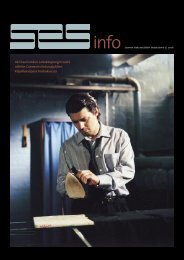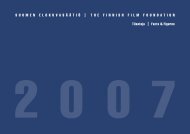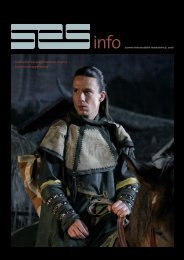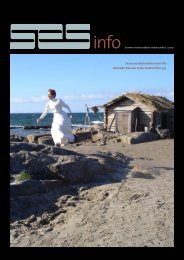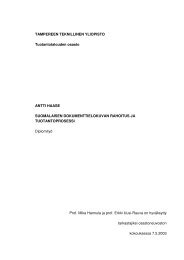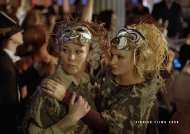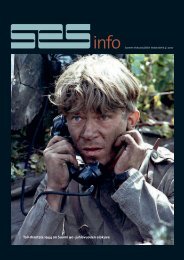Finnish Documentary Films 2011
Finnish Documentary Films 2011
Finnish Documentary Films 2011
Create successful ePaper yourself
Turn your PDF publications into a flip-book with our unique Google optimized e-Paper software.
Barzakh<br />
Canned Dreams<br />
Canned Dreams is a film about workers and their dreams on the journey of a canned<br />
food product.<br />
In our film, we build a portrait of ordinary workers through their own, personal<br />
stories from multiple cultures. We hear them telling about the most important<br />
moments in their life, and the dreams that would make their own world a better<br />
place. All this happens in a frame of following the route of a tin can which starts<br />
it’s journey from the other side of the world and travels all across Europe. In this<br />
film the beauty of humanity is seen through working hands.<br />
<strong>2011</strong> | 35mm, HDCAM, DigiBeta | 1:1,85 | Dolby 5.1 | 52’ and 80’<br />
Barzakh<br />
In a Chechen city recovering after the war, a man disappears. As daily life goes<br />
on, those in search are drawn into a world where encounters with diviners and legal<br />
advisors, with the torturers and the tortured, with secret prisons and mythical<br />
lakes all become commonplace. When the disappeared do return in dreams, they<br />
are said to come from Barzakh – a land between the living and the dead.<br />
Finland/Lithuania | <strong>2011</strong> | DigiBeta, 35mm | 16:9 | Dolby | 59’<br />
Director: Mantas Kvedaravicius Script: Mantas Kvedaravicius Cinematography: Mantas<br />
Kvedaravicius Additional photography: Ahmed Gisaev, Zarema Mukusheva Editing:<br />
Mantas Kvedaravicius Editing supervisor: Timo Linnasalo Editing assistant: Mindaugas<br />
Galkus Editing consultant: Giedrius Zubavicius Sound design: Tero Malmberg Producer:<br />
Aki Kaurismäki, Mantas Kvedaravicius Production company: Sputnik Oy Co-production:<br />
Extimacy <strong>Films</strong> Production support: The <strong>Finnish</strong> Film Foundation Financing TV company:<br />
YLE TV2 Documentaries International sales: The Match Factory GmbH<br />
Mantas Kvedaravicius<br />
Mantas Kvedaravicius was born in Birzai, Lithuania in 1976. He holds<br />
a Master’s Degree in cultural anthropology from the University of<br />
Oxford and is currently completing his PhD dissertation and a book<br />
manuscript on the affects of pain at the University of Cambridge.<br />
Kvedaravicius has taught university courses on religion, law, and<br />
political theory in New York, and since 2006 he has been conducting<br />
research on torture and disappearances in the North Caucasus.<br />
Barzakh is his first film. Kvedaravicius is also an underwater<br />
archaeologist. He lives in Lithuania raising his two children.<br />
Mantas Kvedaravicius<br />
Director: Katja Gauriloff Script: Katja Gauriloff, Joonas Berghäll and Jarkko T. Laine Cinematography:<br />
Heikki Färm, Tuomo Hutri Editing: Jukka Nykänen Sound design: Peter Albrechtsen<br />
Music: Karsten Fundal Producer: Joonas Berghäll Production company: Oktober Oy<br />
Production support: The <strong>Finnish</strong> Film Foundation, AVEK, MEDIA programme, Nordisk Film<br />
& TV Fund Financing TV company: YLE TV2 Documentaries, ARTE, RTP, NRK, TG4, Noga<br />
Communications International sales: Deckert Distribution GmbH | Heino Deckert<br />
Katja Gauriloff<br />
Katja Gauriloff was born in 1972 in Inari. She has studied filmmaking at the Tampere University<br />
of Applied Sciences, School of Art and Media (2000–2004). She has been involved<br />
in filmmaking since 1998. Today she is a film director and part-owner of the Oktober Oy<br />
production company.<br />
Selected filmography:<br />
A Shout into the Wind documentary, 2007<br />
Director Katja Gauriloff:<br />
It was the first time in my life that I worked at a factory. My job was to package sausages<br />
on a conveyor belt. The work was physically demanding and monotonous. Once an hour<br />
we had a seven-minute break. There was just enough time to run to the break room for a<br />
cup of coffee. Those were the best moments at the job, sitting in the break room where<br />
the factory ladies, some of whom had worked there at the same job for 30 years, were<br />
having a quick coffee and a cigarette. I came from Lapland, so I didn’t always understand<br />
what they were saying in their old Helsinki slang, but the stories were pretty racy. I kept<br />
quiet, listened and soaked in their life experiences, dreams and wishes.<br />
Now, almost 20 years later, I find myself in the Brazilian Amazonas at one of the largest<br />
open mine areas in the world. I sit there on<br />
the rocks and people around me work really<br />
hard for their lives. I listen to the stories and<br />
dreamsof a woman around my age, who has<br />
worked all her life in the slavery system of<br />
the mines. Even though our worlds are very<br />
different, I am amazed how similar and<br />
universal our dreams are all around the world.<br />
Katja Gauriloff<br />
Canned Dreams<br />
12 <strong>Finnish</strong> <strong>Documentary</strong> <strong>Films</strong> <strong>2011</strong>


